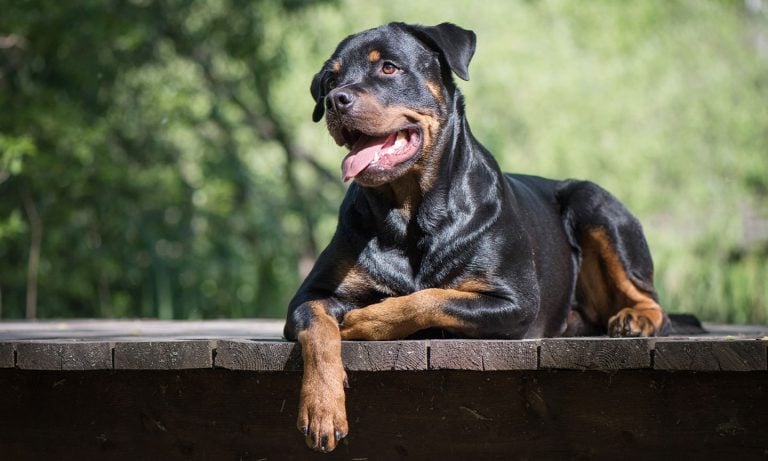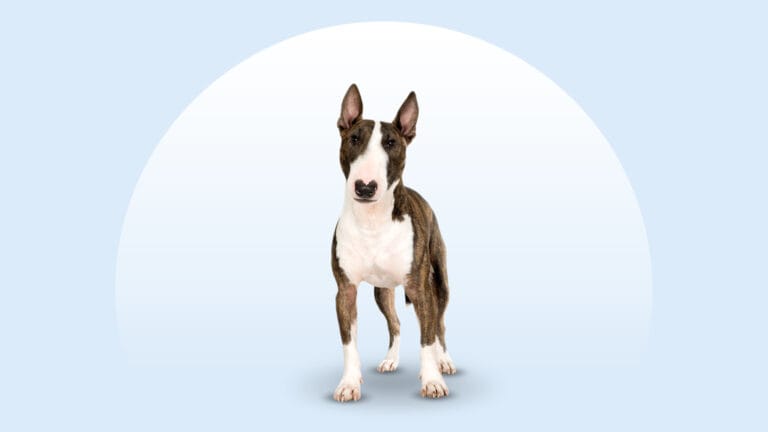Rottweiler vs Bull Terrier

Breed Snapshot
Best For
A popular working breed, Rottweilers do best with experienced pet parents who can provide early training and socialization. These robust, large-sized dogs thrive in homes with active individuals or families, appreciating both mental and physical...
A popular working breed, Rottweilers do best with experienced pet parents who can provide early training and socialization. These robust, large-sized dogs thrive in homes with active individuals or families, appreciating both mental and physical challenges.
Rottweiler Temperament
Rottweilers are powerful and intelligent dogs who benefit from early training and socialization. They are easy to train and eager to please their families, but are also strong-willed and may seem aloof to the outside world. Originally descending from the mastiffs of the Roman legions, Rottweilers have been valuable...
Rottweilers are powerful and intelligent dogs who benefit from early training and socialization. They are easy to train and eager to please their families, but are also strong-willed and may seem aloof to the outside world.
Originally descending from the mastiffs of the Roman legions, Rottweilers have been valuable companion animals and working dogs for centuries. This is just as true today as it was years ago—families that are willing to put in the time to train and socialize their Rottweiler will be rewarded with an intensely loyal and energetic dog.
In fact, Rottweilers are much more emotionally needy than many people assume. This dog has a fearsome reputation, but in reality, Rottweilers are obsessed with their people and want to be around them all the time. Rottweilers who are isolated from people or kept alone may begin to exhibit unwanted behaviors when they do finally get access to people.
Rottweilers were originally bred to be protectors. Combined with their great strength, this makes it especially important that Rottweilers are properly trained and socialized. Once socialized, Rottweilers can easily get along with other dogs and young children. Like any dog, Rottweilers who are poorly trained, subjected to harsh discipline, or isolated are more likely to exhibit unwanted fear-based behaviors, including biting and aggression.
One especially interesting features of these dogs is their vocalization. Rottweilers aren’t known for excessive barking (although of course they can and will bark), but they do have a deep rumble that sounds almost like a growl. Some pet parents think of this rumbling sound as “talking.” This “Rottie rumbling” is almost like the purring of a giant cat and often means your Rottweiler is happy and content, particularly during belly rubs.
Rottweiler Traits

Breed Snapshot
Best For
Playful and energetic, Bull Terriers excel with experienced and highly active pet parents who, ideally, live in large homes with yards and can provide plenty of training and socialization. Bull Terriers like to be the...
Playful and energetic, Bull Terriers excel with experienced and highly active pet parents who, ideally, live in large homes with yards and can provide plenty of training and socialization. Bull Terriers like to be the stars of the show, so they do best as a one-pet act.
Bull Terrier Temperament
The fiery-but-loveable Bull Terrier breed has an unmistakably larger-than-life personality. However, they can quickly turn destructive without consistent training and lots of attention, so make sure you keep an eye on them—and your furniture. For this four-legged companion, boredom is especially lethal. Although they are independent, strong-willed free thinkers, don’t leave them...
The fiery-but-loveable Bull Terrier breed has an unmistakably larger-than-life personality. However, they can quickly turn destructive without consistent training and lots of attention, so make sure you keep an eye on them—and your furniture. For this four-legged companion, boredom is especially lethal. Although they are independent, strong-willed free thinkers, don’t leave them to their own devices for long.
Always up for a good time, this clown in a dog suit takes a back seat to no one and can be aggressive with other dogs in the family. Early socialization to family pets is recommended, and wait for kids to get a little older before bringing a Bull Terrier dog home. (Unless you have a cat. Bull Terriers refuse to share the stage with a cat.) They need a confident pup parent who has experience with dogs to help them remember they’re not directing this show. If you’re not confident in your abilities or haven’t had much experience with dogs before, a Bull Terrier puppy may not be the best match for you.
But for the right family, Bull Terrier dogs make the most loyal of companions and the most tireless of playmates. You’ll never be lonely again as they drag you out of the house for so many walks. They need lots of daily exercise and have loads of love to give their families. They are not wallflowers, so they like to meet new people and add them to the “troupe,” whether they’re chasing a friend in the park or greeting visitors at home. Just make sure you make the proper introductions; Bull Terriers are not as friendly as Cavalier King Charles Spaniels.
You’ll also appreciate their intelligence and agility. That fumbling, bumbling act they put on is just for appearances’ sake to get a laugh out of you.




